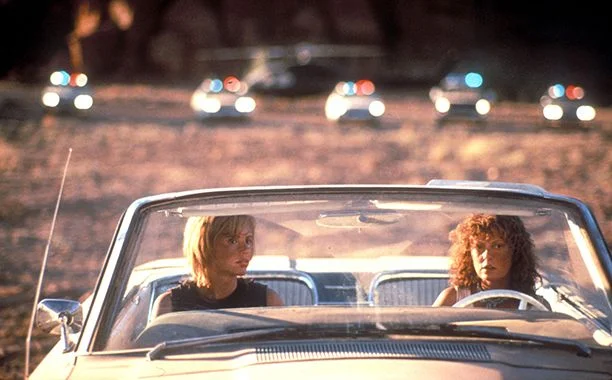Thelma and Louise: More than a Road Trip
To understand why Thelma (played by Geena Davis) and Louise (played by Susan Sarandon) make this final, fatal decision, it's essential to look at the broader context of the film. At its core, Thelma & Louise is about two women seeking liberation from the societal, personal, and patriarchal constraints that define their lives.
Thelma is a repressed housewife, married to an overbearing, controlling husband. Louise, on the other hand, is a waitress haunted by a traumatic past, which hints at a previous sexual assault. Both women are, in their own ways, trapped in lives where they have little control over their destinies. When they set out on a road trip for a weekend getaway, they aren't just seeking fun—they're escaping their stifling realities.
This quest for freedom, however, quickly takes a dark turn. After Thelma is nearly raped at a bar, Louise intervenes, shooting and killing the man who attacked her. What begins as a fun road trip spirals into a desperate flight from the law, as the two women become fugitives, facing ever-increasing odds.
A Symbolic Rebellion
The decision to drive off the cliff is not simply about avoiding capture. It is a profound act of rebellion. Thelma and Louise have been oppressed by a male-dominated society at every turn. From Thelma’s abusive husband to the violent sexual assault, to the male law enforcement that is hunting them down, the film continuously showcases how the patriarchy has trapped and marginalized these women.
In the final moments, when the police have them surrounded at the edge of the Grand Canyon, the women realize that surrendering means giving up all the freedom they fought for. Returning to their old lives or going to prison would put them right back into a system that has exploited, abused, and controlled them. Driving off the cliff is their way of choosing their own fate, a decision that defies the notion of a male-controlled destiny. It is not just about escaping punishment, but about seizing control of their lives in a world that has given them none.
Freedom or Death
Throughout Thelma & Louise, the concept of freedom is ever-present. The American Southwest, with its vast, open landscapes, becomes a symbol of the freedom the two women crave. But even as they drive through these wide-open spaces, they are constantly pursued by law enforcement, a metaphor for how women’s freedom is limited and always under surveillance.
By the time they reach the cliff, the options have been stripped away. Louise, in particular, seems to realize that the kind of freedom they’ve been chasing might not exist for them within the boundaries of the law or society. This realization is echoed in Louise’s decision not to go to Mexico, which she initially thought could be their salvation. Even south of the border, they would be outsiders, still on the run.
Driving off the cliff, then, becomes the ultimate gesture of defiance. It is the one action that law enforcement, and by extension, the patriarchy, cannot control. In a way, Thelma and Louise are saying that they would rather die than submit to a system that seeks to strip them of their autonomy.
The Power of Female Friendship
One of the film’s most compelling themes is the friendship between Thelma and Louise. As their journey unfolds, the bond between them deepens. They rely on each other, protect each other, and ultimately love each other in a way that transcends the romantic relationships they have with men.
Their decision to drive off the cliff together underscores the strength of this bond. In that final moment, when Thelma suggests they "keep going" rather than surrender, it’s clear that the two women have reached a place of mutual understanding and solidarity. This is no longer just about survival—it’s about choosing how they want their story to end, together, on their own terms.
The film portrays their friendship as a source of power and strength in the face of adversity. In a world where men have consistently failed them—either by oppressing, abusing, or abandoning them—Thelma and Louise find their only true support in each other. Their decision to die together, rather than be torn apart by the system, is a testament to the unbreakable bond they’ve formed.
A Controversial Ending
When Thelma & Louise was released, its ending was both celebrated and criticized. Some saw it as a defeat, arguing that it reinforced the idea that women cannot escape their circumstances, that the only way out is death. Others, however, viewed it as a triumph—an act of ultimate liberation and resistance.
The film’s screenwriter, Callie Khouri, has stated that the ending was never meant to be viewed as a tragedy. In her mind, Thelma and Louise’s decision to drive off the cliff is a moment of empowerment. They take control of their fate, refusing to be captured or punished by a system that has failed them at every turn.
This dual interpretation is part of what has made the ending so enduring. It invites audiences to grapple with the complexities of freedom, agency, and the limits placed on women by society. Are Thelma and Louise victims, or are they heroines? Is their final act one of despair, or one of defiance?
Conclusion: A Legacy of Defiance
More than 30 years after its release, Thelma & Louise continues to resonate with audiences. The film’s iconic final scene—where the car soars over the edge of the cliff in slow motion—has become a symbol of both female empowerment and the harsh realities women face in a patriarchal society.
Thelma and Louise didn’t drive off the cliff because they had no other options; they did it because they chose to. In a world that offered them no real freedom, they created their own, however brief it may have been. Their final act was not a surrender, but a refusal to be subjugated. And in that refusal, they became legends.








Social Plugin